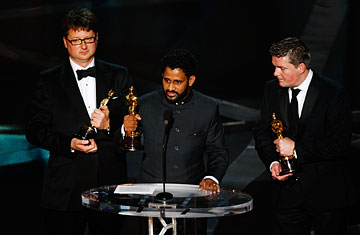
Ian Tapp, Resul Pookutty, and Richard Pryke accept their Oscars for sound mixing for Slumdog Millionaire during the 81st Academy Awards
India has clearly been the flavor of this Oscar season. While Slumdog Millionaire predictably won eight of the 10 golden statuettes it was in the running for — including the Best Picture — even the low-profile Smile Pinki, a documentary about a girl from a village in India with a cleft lip, surprised with its win in the Short Documentary category. Indian TV anchors have been wildly ecstatic, but reactions outside newsroom are decidedly mixed. Some feel happy for Slumdog's Indian connection — especially for the awards for A.R. Rahman (best original score and for theme song Jai Ho) and Resul Pookutty (best sound mixing) — yet many feel the film was overrated. Critics opine the awards signal a belated acceptance of Bollywood's song-and-dance formula, but point out that this is a win for a western film, made by a westerner (British director Danny Boyle), for a western audience. (See pictures of Danny Boyle: A Life Behind the Lens.)
"What is significant for us in India is that Rahman won two Oscars, and Pookutty won, too," says New Delhi-based film critic Vinayak Chakraborty, "This officially recognizes the power of the songs and dances of Bollywood cinema. It is debatable whether Slumdog is Rahman's best work, but it does give cognizance to Indian talent." In addition to Rahman and Pookutty, many of the film's cast are already celebrated, respected names in Indian cinema. Gulzar, who won the Oscar for best original song along with Rahman for Jai Ho, is a venerated writer, poet and lyricist; actors Anil Kapoor and Irrfan Khan are among the best in the trade. "I'm super-happy for Rasool [Pookutty], but Rahman and Gulzar are already well-known. They don't need an Oscar to validate their talent," says Mumbai-based assistant film director Tony Deol. Nevertheless, Deol says that alone, all the first-rate Indian talent in the film put together would not have garnered an Oscar nomination. "If you take out the director and producer, it wouldn't even have got a nomination. This film won due to all the Danny Boyle hype." Harjot Singh, an IT expert with a Noida-based BPO, adds: "Smile Pinki, which won in the Best Short Documentary category, is also made by a U.S.-based filmmaker. I'm happy this has been India's season at the Oscars, but it is certainly not Indian cinema's." (See the 10 Indian films to treasure.)
Since its release here in late January, not everyone in India warmed to Slumdog the way western viewers did. "Initially when I saw the film I didn't like the parts where people spoke English and cracked American jokes," says Tony Deol, a Mumbai-based assistant film director. "For someone in India, living in Mumbai, it rang false." Those who liked the film, however, say they hope the Academy's accolades will help mainstream good Indian cinema. "By recognizing Indian talent, I hope people in the west will realize there's more to Indian cinema than just song and dance," says Priya Khanna, a general manager with Pepsico, "I hope good Indian cinema will be able to break the Bollywood stereotype and reach audiences within India and abroad."
But film critic Vinayak Chakraborty says that is highly unlikely; Bollywood's vocabulary, he says, is entirely different than western cinema's. "The Oscars are unlikely to change anything for Bollywood. The Oscars have their own cinematic idiom that tells stories in a particular way. It's different from the Indian idiom which is larger than life and melodramatic." Film director Deol adds, "At the end of the day, [India's] big studios and big filmmakers know their market well, they know where the revenues lie. They will continue to make films for India and for the NRI [non-resident Indian] market, but not for the non-Indian market."
